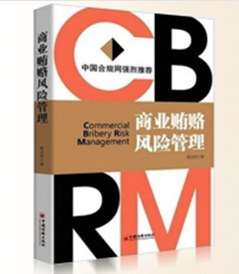ComplianceinChina.com
conducted surveys on Chinese corporate compliance management for three
consecutive years. Under the auspices of ComplianceinChina.com, one of the
largest and earliest compliance platforms in China, The Compliance Reviews
(www.compliance.reviews or www.compliancereviews.cn) is an English electronic
journal aiming to enhance compliance and risk management in Asia and beyond.
In the year 2016,
ComplianceinChina.com conducted a Chinese survey through its WeChat account 合规 (literal translation as compliance).
The survey began on August 28, 2016, and continued through January 25,
2017, with 425 participants.
According to survey
data, 83% of the participants of this survey were compliance officers or functionaries,
with 119 senior compliance officers (i.e., country or regional directors) and
233 junior or middle-levelled compliance officers. The remaining 17% presumptively included
business managers or other functionaries. That being said, with a 83% of participants
directly involved in corporate compliance management, the survey reflects
China’s modern landscape of compliance management.
As according to our
custom, we are issuing our survey results before the Chinese New Year, which
falls on January 28th this year.
If you have any questions
about this survey, please do not hesitate to contact
henry@compliancereviews.cn.
Hereinafter are the
survey results:
1.
Foreign-invested enterprises have placed greater emphasis on compliance.
A foreign-invested
enterprise is an enterprise that has at least one shareholder from a
non-Chinese country.
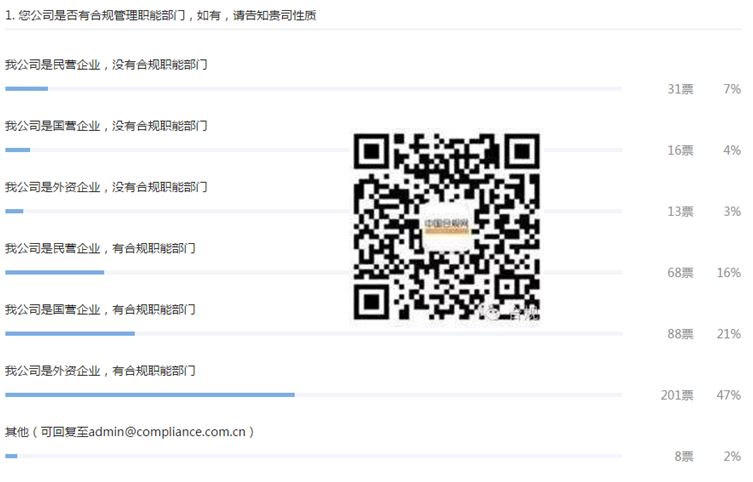
Out of 425 participants,
201 participants (47%) revealed that the companies they are affiliated with are
foreign-invested enterprises with a compliance function. Only 13 participants (3%) selected that their
respective company are foreign-invested enterprise without a
compliance function.
In comparison with
foreign-invested enterprises, state-owned enterprises and private businesses
care less for compliance management.
There are 88 participants from state-owned enterprises (21%), and 68
from private businesses (16%) claiming that they have compliance functions, far
less than the 47% of foreign-invested enterprises with compliance functions.
Compared with 3% of
foreign-invested enterprises without compliance functions, 4% of state-owned
enterprises and 7% of private businesses do not have compliance functions.
2.
Fear of different punishments is the main motive behind compliance functions
Compliance is defined
as the observance of law or corporate code.
For the multiple-choice question “What is the driving force behind
compliance policies in your company?”,
--214 (28%) selected
“if my company is punished, I am doomed” (25% in 2015)
--178 (23%) selected
“high-levelled executives will be subject to personal liabilities including
criminal liabilities” (29% and ranked No. 1 in the year of 2015).
--137 (18%) selected
“My company will punish me” (22% in last year).
--222 (29% and ranked
No. 1) selected “Compliance is the biggest wisdom of a long-lasting company”
(22% in last year.)
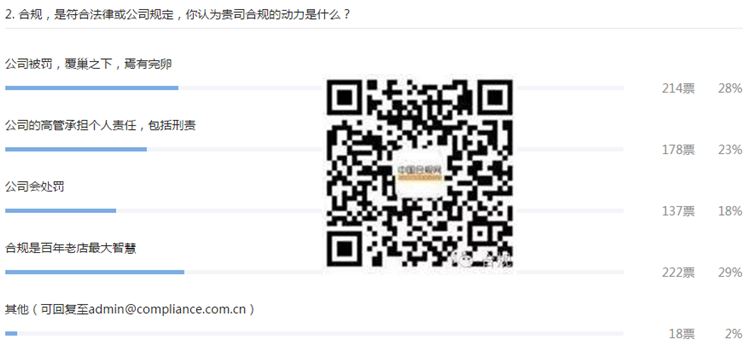
According to the survey
results, 69% percent of participants comply with law or corporate code out of
fear for something; 29% believe that compliance is wisdom to ensure the
longevity of a long-lasting company.
If you wish to learn
more about the driving force behind compliance, below are some helpful
articles.
Can we swim out of that water of sorrow? (in
Chinese language)
Why shall we
“compliance”? (in Chinese language)
Integrity and
compliance shall be the corner stone of corporate culture (in Chinese language)
3.
Lack of cooperation from the colleagues of business departments and inadequate
support from higher-ranking officials are two large obstacles facing Chinese
compliance.
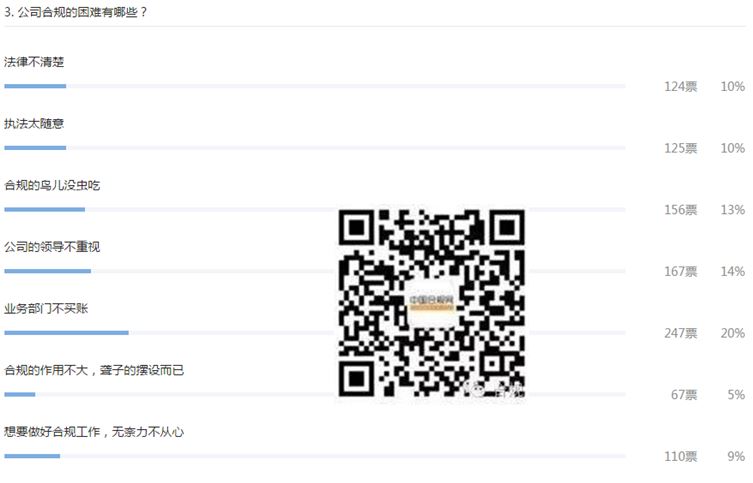

For the multi-choice
question, what are the difficulties for corporate compliance? The difficulty No. 1 is that business
departments do not buy it (247 selections taking 20%), which was ranked No. 1
as well in 2015 amounting to 21%. About
this article, you may read the article of Tone from
the Middle Cannot be Ignored (in English language).
The difficulty No. 2 is
that the top does not support (167 selections taking 14%).
Difficulty No. 3 is
that birds of compliance eat nothing (156 selections taking 13%), which was
ranked No. 2 in 2015 taking 16%. About
this topic, please read the article of the Impact of Dodd-Frank on U.S.
Companies Doing Business in China (in English language with Chinese
introduction).
Difficulty No. 4 is
that compliance officers do not have power and cannot carry out their work (149
selections taking 12%).
Difficulty No. 5 and
No. 6 are about law-making and law-enforcement.
There were 125 selections of “the enforcement of law is arbitrary” (10%)
and 124 selections of “law is not clear” (10% as well).
Difficulty No. 7 is
about compliance officers themselves – 110 selected that that my capacity is
disproportionate to my desire of doing compliance well (9%), which was 15% in
the year of 2015.
Difficulty No. 8 is
that compliance officer is the scape-goat taking blames for any wrong doing (77
selections taking 6%).
Difficulty No. 9 is
that compliance is window dressing which is not much useful (with 67 selections
taking 5%).
There are 16 selecting
others amounting to 1%.
4.
Even though anti-bribery remains a large part of compliance in China, compliance
has begun to branch out into other areas.
Anti-bribery is ranked
as compliance duty No. 1 with 392 selections (18%), a two point decrease from
the 20% result in the 2015 survey.
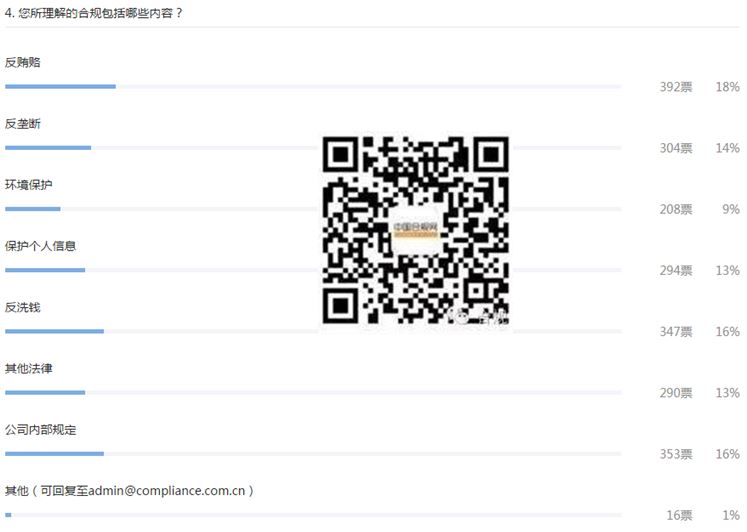
Compliance with internal
codes of corporate and anti-money laundering are ranked respectively No. 2 (with
353 selections) and No.3 (with 347 selections).
Each of them amounts to 16%.
Anti-monopoly has 304
selections ranked No. 4 (14%), which was 16% in the year of 2015.
There were 294 people
selecting the protection of personal information as compliance duty, which is
ranked No. 5 taking 13%, which was 16% in the year of 2015. With the same 13%, 290 people selected other
laws.
No. 7 is about the duty
of protecting environmental, which amounts to 9%.
5.
About 1/10 companies never do compliance training; about half of the companies
do trainings just once or twice per year.
About half of the
participants selected the option “once or two trainings per year” (198
selections, 47%).
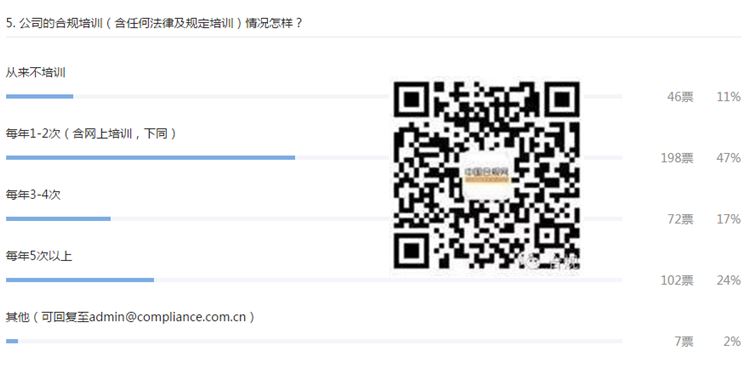
About a quarter does
compliance training more than 5 times per year (102 selections, 24%), and 17% of
the participants do training 3 or 4 times per year.
11% of participants
selected “No Training".
6.
On anti-bribery, Chinese law is the most important among other compliance
duties.
When asked “what are
your compliance duties on anti-bribery”, 394 selected Chinese anti-bribery law
amounting to 48%, a 11% increase from the 37% from the 2015 survey.
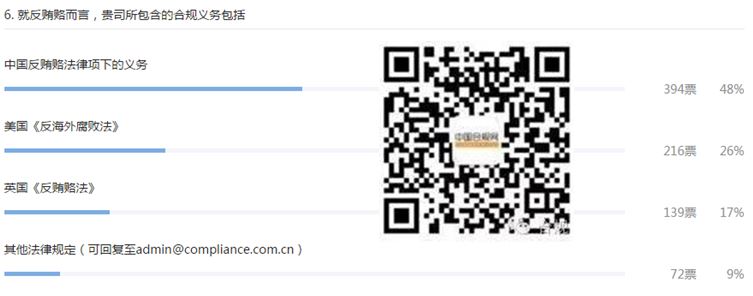
In terms of the FCPA,
there were 216 selections amounting to 26%; in terms of the UK Bribery Act, 139
people made selections amounting to 17%.
Despite the dwarfed rankings, we believe the FCPA is still the most influential
law for those on whom the FCPA is applicable, so is UK Bribery Act. It is worth
mentioning that 72 people selected other laws, which could include Sapin II –
the “FCPA” of French version. About this
topic, please read the article of France Has its Own FCPA with More Severe Punishment (in Chinese language). Please refer to the article Why Is Chinese Anti-Bribery Law a Very Important Compliance Obligation?
7.
Half of companies believe that compliance in 2016 was harder than before.
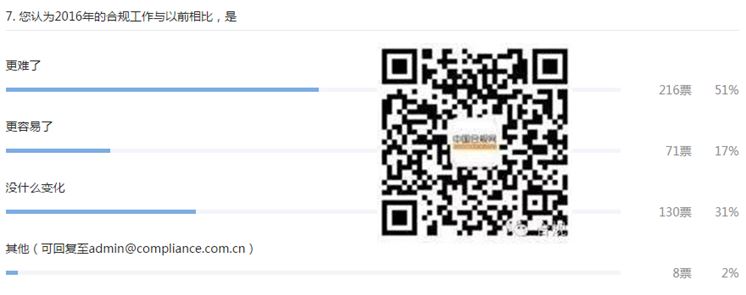
About 216 participants
believed that the compliance job in 2016 is harder than before (taking 51%);
130 selected no change. However, 71
believed that it was easier, amounting to 17%.
8.
Compliance awareness and performances were dramatically enhanced in 2016.
About 271 people
selected that “the compliance awareness and performance are enhanced”,
amounting to 64%.
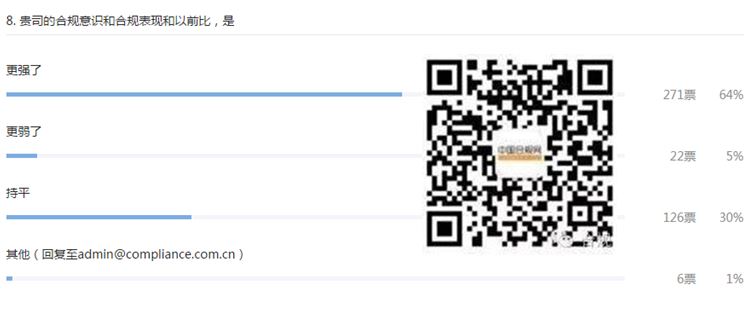
Despite 22 people
selecting “weaker” (only amounting to 5%), there were 126 people selected “Same
as previous"(amounting to 30%).
9.
Some senior compliance officers were paid well; some were not.
This year, we surveyed
about how a senior compliance officer was paid (senior compliance officer
includes country or regional director); 113 participants fall within this
category.

Among the 113 senior
compliance officers, 8 selected that their pre-tax salary (including bonus) is
above RMB 3 million (about US$ 440,000 at the conversion rate of 6.8) amounting
to 7%.
There were 9 people
selecting between RMB 2-3 million (about US$ 294,000 to US$ 440,000 at the
conversion rate of 6.8) , which amounts to 8% among total 113 participants.
There were 35 senior
compliance officers selecting between RMB 1 - 2 million (about US$147,000 to
US$ 294,000 at the conversion rate of 6.8); 61 senior compliance officers
selecting below RMB 1 million.
10.
Some junior or middle-levelled compliance officers are paid very well, but most
are paid below US$ 74K annually.
There were 239 junior
or middle-levelled compliance officers are involved in the question on salary
of junior or middle-levelled compliance officers.
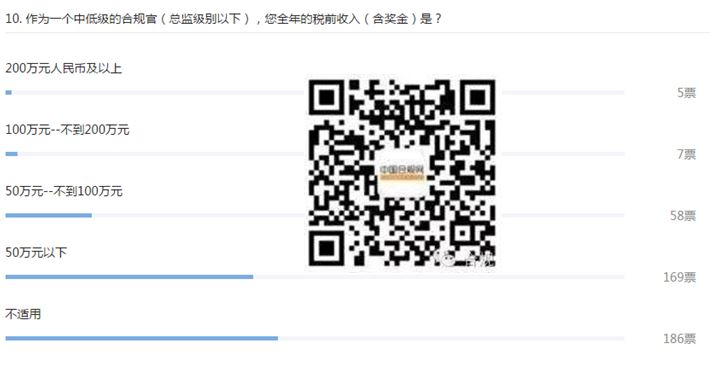
Five of 239 (2%) said
that their pre-tax salary (including bonus) was more than RMB 2 million (about
US$ 294,000 at the conversion rate of 6.8); 7 (3%) selected the category
between RMB 1 - 2 million (about US$147,000 to US$ 294,000 at the conversion
rate of 6.8).
There were 58 (24%) who
selected the category between RMB 500,000 to 1 million (about US$ 74,000 to US$
147,000 at the conversion rate of 6.8), and there were 169 selecting below RMB
500,000, which amounts to 71%.
If you have any questions
about this report, please do not hesitate to contact
henry.chen@dentons.cn.
*The author Henry Chen, a Senior Partner of Dentons Shanghai Office, is licensed to practice law in China and the New York State of the U.S. Before joining Dentons, Henry worked in Ford as its AP Compliance Director. Henry Chen is a representative of China Delegation to negotiate over ISO19600 Compliance Management System - Guidelines, and the Vice Director of the Working Committee on China national standard Compliance Management System. Henry Chen is the author of the book Commercial Bribery Risk Management in China. You may also visit Henry's column "Competition & Monopoly" maintained with Caixin Media. Henry is available at henry.chen@dentons.cn
